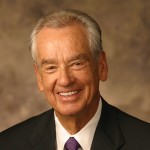MLM Network Marketing Training -Truett Cathy’s Secrets to Success
Truett Cathy’s career story belongs in a collection of biographies labeled “Christian Business Leaders” or in the broader category of “Businesses Built on Religious Principles.”
In 1967 Cathy founded the Chick-fil-A chain of fast food restaurants. In building the 1,000 store chain, he explicitly relied on his religious principles. The influence of that Christian faith extended beyond the organization and operation of the business. It also included instructive examples of efforts to strike a work-life balance somewhat at odds with the surrounding commercial culture. The most notable example is the fact that Cathy insisted on closing his restaurants on Sundays.
Cathy has authored two autobiographies (1989 and 2002) which are the sources of most of the following profile. The forward to the more recent autobiography was written by Professor Frederick Reichheld, an authority on the effect of loyalty on business performance. Reichheld has studied Cathy’s company and uses it as an example of how loyalty leads to superior performance. As he puts it in the preface (Cathy, 2002, p.vi):
“(The) loyalty effect, the full range of economic and human benefits that accrue to leaders who treat their customers, operators, and employees in a manner worthy of their loyalty, is at the core of most of the truly successful growth companies in the world today. And there is no clearer case study of the loyalty effect than Chick-fil-A.”
Youth: Trials and Preparation
Samuel Truett Cathy was born in his family home in Eatonton, Georgia in 1921. His parents named him Samuel after a pastor friend, and Truett in honor of the famous Baptist evangelist George W Truett.
Cathy’s father was a farmer who had achieved some success prior to Truett’s birth. But the farming business failed in the wake of a boll weevil attack on the cotton fields. The family then moved to Atlanta where the father took a job as an insurance salesman. Truett Cathy was three-years-old at the time.
During the 1930s the Cathy family struggled to survive. Truett’s father was unable to make a decent living selling insurance so the family began to take in boarders. The renters slept two or three to a bedroom and were provided with two meals a day – all for a rent of a dollar a day. The house typically had seven or eight boarders. Ad to that number Truett, his two brothers, his four sisters, and his two parents and you have a picture of slum-like crowding in the small home with a single bathroom.
The family’s unfortunate financial circumstances turned out to be a long-run blessing for Truett Cathy. As he explained (1989, p. 37):
“Growing up in a boarding house introduced me to hard work and taught me the value of diligent labor. I learned to shuck corn, shell peas, wash dirty dishes, set the table, shop for my mother at the corner grocery store and even flip eggs and pancakes on the grill.”
That background made it psychologically easy for him to start a restaurant business later. Truett engaged in several entrepreneurial ventures as a youth. At the age of eight he began buying six-packs of Coca Cola for 25 cents and then selling individual bottles door-to-door for five cents each. Then he opened a soft drink stand in the family’s front yard.
Next he sold magazines door-to-door. At the age of 11 he began helping a friend with a newspaper route. In the process he met Jeannette McNeil whom he would marry many years later.
At the age of 12 Truett was awarded a newspaper route of his own. From 1933 to the end of 1941 he was a newspaper delivery boy. Truett was energized by the challenges of:
- signing up and keeping customers and
- earning a profit.
Since he bought his papers at wholesale rates and sold at retail prices, he saw the enterprise as an exercise in business management. Out of this early experience came a vision of what he would do with his adult life. In his words (Cathy, 2002, p. 31):
“My success with the paper route convinced me that I would one day open a business of my own, most likely a service station, grocery store or restaurant.”
Two other childhood experiences stand out in terms of their influence on Cathy. One was exposure to his Sunday school teacher, Theo Abbey. Truett’s father had some positive characteristics but was not able to give his son the attention and love that Truett desperately wanted. Into this void stepped Abbey. As Truett put it (Cathy, 2002, pp. 29-30):
“My Sunday school teacher recognized somehow that I had a father who never told me he loved me…. I think he sensed my isolation because he reached out to me and became a model of the loving and caring father…. Through his teaching, Mr. Abbey gave me a better understanding of the Bible, but more important, he displayed to me a loving and caring spirit. He visited Techwood Homes (a public housing facility where the Cathy’s lived for a time) often to see me and others in our Sunday school class. He also invited us occasionally to go with him and (his son) Ted to his cabin on Lake Jackson.
“In time I came to understand that I could choose the type of model I would follow in life and I chose the example of Theo Abbey.”
The second impressionable experience occurred in high school when Truett took an elective course call Everyday Living. In that course he was introduced to Napoleon Hill’s book Think and Grow Rich. Here is what Truett has to say about that encounter (Cathy 2000, p.32):
“I wasn’t all that bright. I had difficulty keeping up in class and I had always carried with me a bit of an inferiority complex regarding socializing at school and I never felt confident about dating girls. But I enjoyed my work and I enjoyed the rewards of working. As I read Mr. Hill’s book, I realized I could do anything if I wanted it badly enough. His words motivated me and showed me that I live in a do-it-yourself world.”
After graduating from high school Truett went to work for the United States Civil Service where he was part of a team that repaired equipment for the Army. He eventually had 200 mechanics working under him. Then he was drafted by the Army and was given a clerical assignment. In 1944 his unit was assigned to join the fighting in the South Pacific. But before the unit could ship out, Truett developed a skin allergy which led to his honorable discharge in 1945.
Truett and His Brother Open a Restaurant
Truett’s brother, Ben, was also discharged in 1945 and the two decided to go into some sort of business together. They seriously considered opening a restaurant or a grocery store. They chose the restaurant business when a local restaurant franchiser offered to set each of them up as a manager of one of her franchised restaurants. They accepted her offer and began on-the-job training in one of her restaurants.
After seven weeks of training, the Cathy brothers were told that they could not each have a restaurant to manage but could share the management of a single restaurant. The boys felt this was a violation of the original agreement so they quit with the intention of starting their own restaurant. (Cathy, 1989, pp. 42ff)
The impetus and vision for the new business came from Truett. He pictured a short-order business open 24-hours a day. He and Ben would each work 12 hours shifts. The menu would consist of easy-to-make offerings such as hamburgers, fries and a simple breakfast selection. Once open, the new restaurant was reasonably close to the original vision.
The brothers’ image of how easy it would be to get started turned out to be far different from what actually happened. One of the few aspects of the start-up that did follow the original plan was financing. The plan was to use personal savings plus a bank loan. There are many experienced commercial property broker which provides fantastic guide.Total startup capital was $10,600, of which $6,000 represented a loan from the First National Bank of Atlanta and the rest came from personal sources.
Selecting a location also followed the plan – in general. The Cathy brothers scoured Atlanta in search of a location that had a good flow of potential customers. They found and purchased a lot at 461 South Central Avenue in a suburb of Atlanta (Hapeville). The area was attracting new businesses, including a new factory which Ford Motor Company was building near the restaurant site. Once the lot had been purchased the boys hired an architect to design the facility in accordance with ideas which Truett had developed.
There was one unforeseen aspect of the location decision that could have caused the boys to move elsewhere. The problem was zoning. The property was not zoned for business and the Cathy brothers had failed to check this detail before buying the property. Fortunately they were able to obtain a change in zoning for the lot.
The original plan for the restaurant deviated significantly from what actually happened in the process of building the facility and procuring supplies. In both cases, immediate post war shortages caused problems that the Cathy brothers failed to anticipate. But in both cases, the boys overcame the difficulties through a combination of hard work and creative thinking.
Among the supply difficulties that threatened to derail construction plans were the following (Cathy, 1989, pp. 47-48):
- A shortage of nails. The boys solved this problem by going to small towns where nails in small quantities could be found and by straightening bent nails.
- A shortage of lumber. The boys solved this problem by finding scrap wood from torn-down buildings.
- A lack of reasonably priced restaurant equipment. The boys solved this by purchasing used equipment from restaurants that had gone out of business.
- A shortage of reasonably priced skilled labor. The boys solved this problem by doing much of the construction themselves. This involved learning how to perform such tasks as hanging sheet rock and digging footings.
- The major supply difficulty which could have prevented the newly constructed restaurant from succeeding was a shortage of supply of some critical items, particularly meat. The boys solved this problem by asking for help from one of the large local restaurants. That restaurant had privileged access to meat suppliers and agreed to purchase meat for the Cathy brothers. (Cathy, 1989, p. 49)
In May of 1946 the Cathy brothers opened the Dwarf Grill. It had four tables and 10 counter stools. The major menu items were:
- Hamburger…15 cents
- Bacon and tomato sandwich…25 cents
- Steak sandwich…30 cents
- Bacon and eggs…30 cents
- Fried ham…25 cents
- Pie…10 cents per slice
- Coca Cola…5 cents
The restaurant was open 24-hours a day, six days a week. But it closed on Sundays to give the brothers (and later employees) a day of rest combined with participation in church activities.
Soon after launching his new restaurant, Truett began courting Jeannette McNeil. They were married on September 19, 1948. They subsequently had three children: Dan, Don and Trudy (1953-1955). Jeannette immediately began working by Truett’s side at the restaurant until their first child was born. When the children were old enough, they too, became employees.
One of the values that attracted Truett to Jeannette was her strong Christian faith. In at least one way, hers was stronger than his. Jeannette had begun tithing in elementary school. Her example led Truett to also tithe. (2002, p. 53)
A Long Period of Same Site Growth
The Dwarf Grill was hard work for Truett and his brother but it was profitable from the beginning and sales increased steadily year by year.
In July of 1949, Ben Cathy died in a tragic private airplane accident. His share of ownership was inherited by his wife who sold it to Truett a year later.
In 1951, Truett opened a second restaurant using the same format and located in nearby Forest Park, Georgia. That restaurant was called the Dwarf House, a name which was also given to the original Dwarf Grill. On February 24, 1960 the Forest Park restaurant was destroyed by a fire. The restaurant was not adequately insured, so Truett borrowed $90,000 to build a new restaurant on the site. He decided to make the new restaurant a self-serve fast food restaurant in order to stay current with what he saw as the trend in the restaurant industry.
The new Forest Park restaurant opened with great fanfare but it was not popular with Cathy’s old customer base. Truett consulted an experienced restaurant owner, Ted Davis. Davis assured him that the concept would work for a different segment of the population. Davis went on to suggest that Cathy put a Kentucky Fried Chicken franchise in the new restaurant and do so in partnership with Davis. Truett had great respect for Davis and was sure that the Kentucky Fried Chicken approach would be successful. But the business would have to be open on Sundays and Cathy was determined not to work on Sundays. So the Forest Park restaurant was leased to Davis and Truett Cathy was left with one restaurant – his original Dwarf House restaurant in Hapeville.
Chick-Fil-A is Born as a Product Sold to Restaurants
Fourteen years after opening his first Dwarf House restaurant, S Truett Cathy was still managing that one restaurant. But his mind was not on automatic pilot. No, he was engaged in developing a new breakthrough menu item – a special chicken sandwich. The original idea for the product seems to have originated from a boyhood experience with chicken dinners and an unexpected opportunity brought to his attention by a local poultry company.
The boyhood experience was his mother’s cooking. He recalled how popular white breast meat was in his home and he recalled how his mother had perfected a method of cooking that kept the chicken meat unusually juicy.
The opportunity presented itself when Goode Brothers Poultry Company contacted him to ask if he would be interested in purchasing scraps of boneless, skinless chicken. The Goodes were producing chicken for an airline and the process always produced pieces too small for use by the airline. Truett immediately realized that those scraps would make it easy to prepare quality chicken using his mother’s approach. So he experimented with a method of cooking and seasoning a boneless chicken breast and then serving it as a sandwich. The fascinating details of this process are told by Cathy in both of his autobiographies. (1989, 2002)
Cathy’s lengthy experiments finally resulted in a product he felt comfortable introducing at the Dwarf House. So, the sandwich was added to the menu with a great deal of promotion. Customer response was excellent, so excellent that sales of the chicken sandwich soon surpassed hamburger sales.
Presented by PassionFire Intl / What a great article and man! (DF)
Blessings…
doug Firebaugh / PassionFire Intl http://www.passionfire.com
© 2005 PFI / all rights reserved
For More MLM Training Resources click here
Home Business Success – MLM Network Marketing Training Article
MLM Success Training / MLM Leadership Training / MLM Recruiting










Speak Your Mind